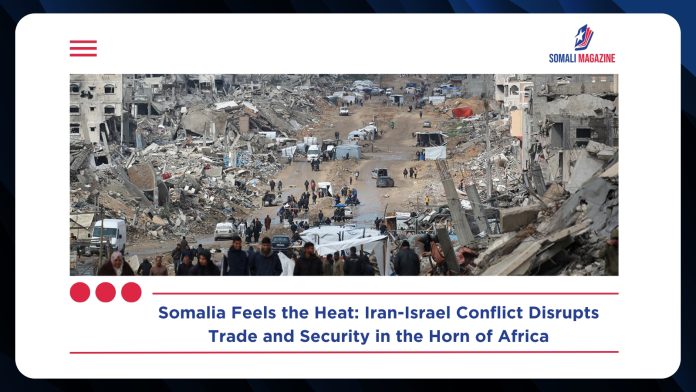Facebook Twitter (X) Instagram Somali Magazine - People's Magazine
The escalating Iran-Israel war is sending shockwaves through global shipping routes, and Somalia is feeling the impact with mounting trade disruptions and growing security concerns. As one of the most import-dependent nations in the Horn of Africa, Somalia’s fragile economy is now at risk of spiraling due to rising freight costs, rerouted maritime traffic, and fears of militant escalation along its coastline.
Somalia’s strategic location near the Bab al-Mandab Strait and the Gulf of Aden places it at the crossroads of global trade. But that advantage has turned into a vulnerability as the conflict between Iran and Israel threatens to destabilize key shipping corridors. The Strait of Hormuz, through which over 17 million barrels of oil pass daily, is now under threat of blockade, pushing oil prices higher and triggering ripple effects across East Africa.
Shipping companies are already paying war-risk premiums of up to 2% of a vessel’s hull value, especially for ships linked to Israel or the U.S. For large oil tankers, this translates into additional costs of up to $800,000 per voyage. These surcharges are trickling down to Somali wholesalers, who rely heavily on imports from Asia and the Gulf. With freight costs surging by more than 20% since the conflict began, Somali consumers are bracing for sharp increases in the prices of essential goods and fuel.
“Somalia’s economy and the food on our tables depend heavily on imports from countries like China and Thailand, which come through Dubai,” said Professor Mohamed Haji Ingiriis of King’s College London. “If this conflict causes disruptions, prices for essential goods and fuel will rise sharply.”

The situation is further complicated by Somalia’s limited domestic production capacity, which has been hampered by decades of conflict, drought, and underinvestment. While the country exported nearly $1 billion worth of livestock in 2023—mostly to Saudi Arabia—its ports remain heavily reliant on inbound shipments of food, fuel, and construction materials.
Security experts are also warning of potential militant activity linked to the conflict. Iran’s ties to the Houthi movement in Yemen, located just across the Gulf of Aden, raise fears of arms transfers to non-state actors in Somalia. The United Nations has previously documented maritime smuggling routes connecting the Gulf of Oman to northern Somalia, and analysts caution that the current geopolitical climate could embolden extremist groups.
“If the world plunges into a third world war, Somalia could experience both positive and negative outcomes,” said Professor Abdiwahab Abdisamad, director of the Afro-Asia Studies and Strategy Institute. “But the immediate concern is the economic and security fallout from disrupted trade routes and potential arms flows.”
The conflict has already forced container lines to divert from the Suez Canal, reducing feeder capacity to East African ports. This has led to delays in cargo deliveries and increased pressure on Somalia’s already strained logistics infrastructure.
As the Iran-Israel war continues to unfold, Somalia’s government and private sector are scrambling to adapt. Importers are exploring alternative routes, while policymakers are calling for regional coordination to mitigate the economic shock. However, with no end in sight to the hostilities, Somalia’s path forward remains uncertain.

